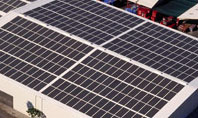That is the prediction of researchers at IT giant IBM who claim solar technologies will become affordable for consumers within five years, as thin-film solar cells come of age.
According to the company's Next Five in Five report, which assesses the innovations the company expects to make a big impact over the next five years, flexible thin-film solar cells will soon become a mainstream technology.
"Until now, the materials and the process of producing solar cells to convert into solar energy have been too costly for widespread adoption," the report claimed. "But now this is changing with the creation of thin-film solar cells, a new type of cost-efficient solar cell that can be 100 times thinner than silicon-wafer cells and produced at a lower cost."
It adds that these cells, which can be produced in large quantities using printing press-style manufacturing technologies, can then be embedded into all types of infrastructure and devices, including "the sides of buildings, tinted windows, cell phones, notebook computers, cars, and even clothing".
In addition to new environmental technologies, the report also predicts the emergence of new health technologies based on DNA analysis that will give individuals a "crystal ball" for their health; voice recognition systems that allow users to surf the web using vocal commands; digital shopping assistants to offer advice and feedback on potential purchases; and smart calendars that analyse the user's diary and activities making it "much easier to remember" what they are supposed to be doing.
The report follows last year's Next Five in Five study, which predicted the emergence of "smart water" technologies that link water supply infrastructure to the internet, making it easier for utilities to optimise flows and save water, as well as the development of more energy efficient means of water desalination based on molecular technologies IBM is working on.
